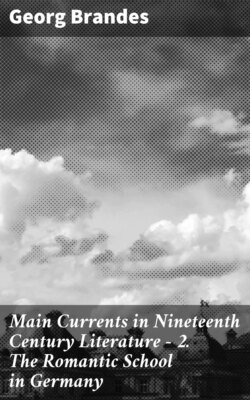Main Currents in Nineteenth Century Literature - 2. The Romantic School in Germany

Реклама. ООО «ЛитРес», ИНН: 7719571260.
Оглавление
Георг Брандес. Main Currents in Nineteenth Century Literature - 2. The Romantic School in Germany
Main Currents in Nineteenth Century Literature - 2. The Romantic School in Germany
Table of Contents
THE ROMANTIC SCHOOL IN GERMANY
INTRODUCTION
I. THE PIONEERS OF ROMANTICISM
II. HÖLDERLIN
III. A. W. SCHLEGEL
IV. TIECK AND JEAN PAUL
V. SOCIAL ENDEAVOURS OF THE ROMANTICISTS: LUCINDE
VI. ROMANTIC PURPOSELESSNESS
VII "LUCINDE" IN REAL LIFE
VIII. SCHLEIERMACHER'S LETTERS
IX. WACKENRODER: ROMANTICISM AND MUSIC
X. ATTITUDE OF ROMANTICISM TO ART AND NATURE
XI. ROMANTIC DUPLICATION AND PSYCHOLOGY
XII. ROMANTIC SOUL. NOVALIS
XIII. LONGING—"THE BLUE FLOWER"
XIV. ARNIM AND BRENTANO
XV. MYSTICISM IN THE ROMANTIC DRAMA
XVI. ROMANTIC LITERATURE AND POLITICS
XVII. ROMANTIC POLITICIANS
MAIN CURRENTS IN. NINETEENTH CENTURY LITERATURE. By GEORGE BRANDES. In Six Vols, illustrated
Отрывок из книги
Georg Brandes
Published by Good Press, 2019
.....
They owed far more to Herder. They evidence their descent from him both by their continuation of the Sturm und Drang period and by their capacity of understanding and reproducing the poetry of all countries. In Herder the new century germinated, as in Lessing the old had come to its close. Herder sets genesis and growth above thought and action. To him the true man is not only a thinking and moral being, but a portion of nature. He loves and sets most store by the original; he prefers intuition to reason, and would overcome narrow-mindedness, not by reason, but by originality. The man of intuitions is to him the most human. His own genius was the genius of receptivity. He expanded his Ego until it comprehended every kind of originality, but it was by virtue of feeling that he comprehended, that he absorbed into his soul a wealth of life, human and national.
From Herder the Romanticists derive that which is most valuable in their literary criticism—the universal receptivity which finds expression in the impulse to translate and explain; from him they derive the first stimulus to a scientific study of both European and Asiatic languages; from him comes their love for what is national in both their own and foreign literature, their love of Spanish romance and of Shakespeare's plays. Herder grasped things in their entirety as did Goethe after him. His profound comprehension of national peculiarities becomes in Goethe the genius's intuition of the typical in nature, and is exalted by Schelling under the name of "intellectual intuition." The objection of the Romanticists to the idea of aim or purpose may be traced back to Herder. His theory of history excluded the idea of purpose: what happens has a cause and is subject to laws, but cannot be explained by anything which has not yet happened, i.e. by a purpose. The Romanticists transferred this theory into the personal, the psychical domain. To them purposelessness is another name for Romantic genius; the man of genius lives without a definite purpose; purposelessness is idleness, and idleness is the mark and privilege of the elect. In this caricature of a philosophy there is not much resemblance to Herder's. But he is the originator of a new conception of genius, of the belief, namely, that genius is intuitive, that it consists in a certain power of perceiving and apprehending without any resort to abstract ideas. It is this conception which, with the Romanticists, becomes scorn of experimental methods in science, and approbation of extraordinary vagaries in art.
.....